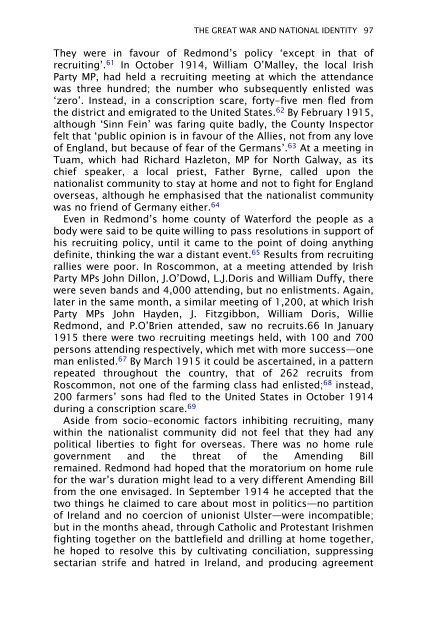Dividing Ireland: World War I and Partition
Dividing Ireland: World War I and Partition
Dividing Ireland: World War I and Partition
You also want an ePaper? Increase the reach of your titles
YUMPU automatically turns print PDFs into web optimized ePapers that Google loves.
THE GREAT WAR AND NATIONAL IDENTITY 97<br />
They were in favour of Redmond’s policy ‘except in that of<br />
recruiting’. 61 In October 1914, William O’Malley, the local Irish<br />
Party MP, had held a recruiting meeting at which the attendance<br />
was three hundred; the number who subsequently enlisted was<br />
‘zero’. Instead, in a conscription scare, forty-five men fled from<br />
the district <strong>and</strong> emigrated to the United States. 62 By February 1915,<br />
although ‘Sinn Fein’ was faring quite badly, the County Inspector<br />
felt that ‘public opinion is in favour of the Allies, not from any love<br />
of Engl<strong>and</strong>, but because of fear of the Germans’. 63 At a meeting in<br />
Tuam, which had Richard Hazleton, MP for North Galway, as its<br />
chief speaker, a local priest, Father Byrne, called upon the<br />
nationalist community to stay at home <strong>and</strong> not to fight for Engl<strong>and</strong><br />
overseas, although he emphasised that the nationalist community<br />
was no friend of Germany either. 64<br />
Even in Redmond’s home county of Waterford the people as a<br />
body were said to be quite willing to pass resolutions in support of<br />
his recruiting policy, until it came to the point of doing anything<br />
definite, thinking the war a distant event. 65 Results from recruiting<br />
rallies were poor. In Roscommon, at a meeting attended by Irish<br />
Party MPs John Dillon, J.O’Dowd, L.J.Doris <strong>and</strong> William Duffy, there<br />
were seven b<strong>and</strong>s <strong>and</strong> 4,000 attending, but no enlistments. Again,<br />
later in the same month, a similar meeting of 1,200, at which Irish<br />
Party MPs John Hayden, J. Fitzgibbon, William Doris, Willie<br />
Redmond, <strong>and</strong> P.O’Brien attended, saw no recruits.66 In January<br />
1915 there were two recruiting meetings held, with 100 <strong>and</strong> 700<br />
persons attending respectively, which met with more success—one<br />
man enlisted. 67 By March 1915 it could be ascertained, in a pattern<br />
repeated throughout the country, that of 262 recruits from<br />
Roscommon, not one of the farming class had enlisted; 68 instead,<br />
200 farmers’ sons had fled to the United States in October 1914<br />
during a conscription scare. 69<br />
Aside from socio-economic factors inhibiting recruiting, many<br />
within the nationalist community did not feel that they had any<br />
political liberties to fight for overseas. There was no home rule<br />
government <strong>and</strong> the threat of the Amending Bill<br />
remained. Redmond had hoped that the moratorium on home rule<br />
for the war’s duration might lead to a very different Amending Bill<br />
from the one envisaged. In September 1914 he accepted that the<br />
two things he claimed to care about most in politics—no partition<br />
of <strong>Irel<strong>and</strong></strong> <strong>and</strong> no coercion of unionist Ulster—were incompatible;<br />
but in the months ahead, through Catholic <strong>and</strong> Protestant Irishmen<br />
fighting together on the battlefield <strong>and</strong> drilling at home together,<br />
he hoped to resolve this by cultivating conciliation, suppressing<br />
sectarian strife <strong>and</strong> hatred in <strong>Irel<strong>and</strong></strong>, <strong>and</strong> producing agreement








